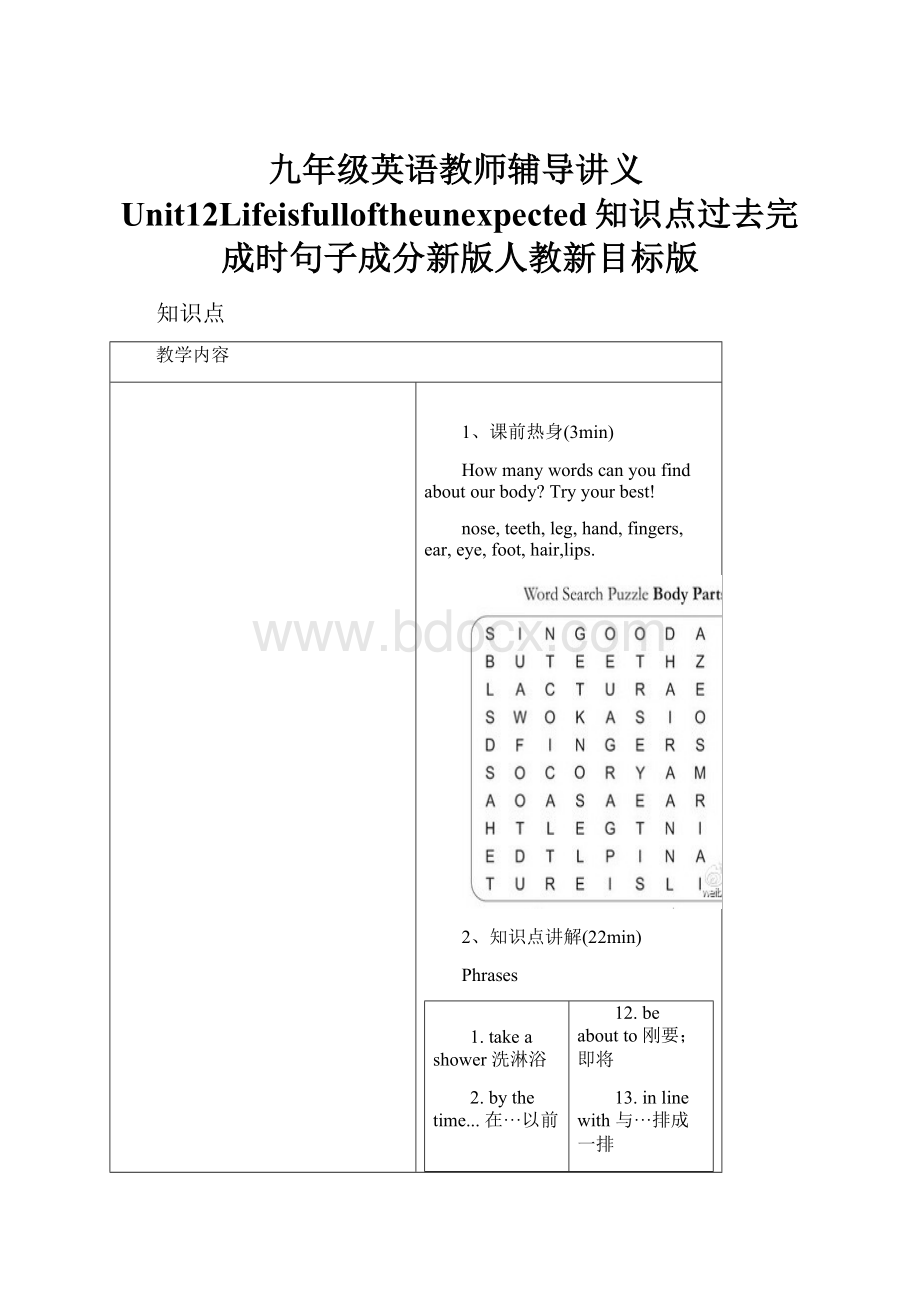九年级英语教师辅导讲义Unit12Lifeisfulloftheunexpected知识点过去完成时句子成分新版人教新目标版.docx
《九年级英语教师辅导讲义Unit12Lifeisfulloftheunexpected知识点过去完成时句子成分新版人教新目标版.docx》由会员分享,可在线阅读,更多相关《九年级英语教师辅导讲义Unit12Lifeisfulloftheunexpected知识点过去完成时句子成分新版人教新目标版.docx(38页珍藏版)》请在冰豆网上搜索。

九年级英语教师辅导讲义Unit12Lifeisfulloftheunexpected知识点过去完成时句子成分新版人教新目标版
知识点
教学内容
1、课前热身(3min)
Howmanywordscanyoufindaboutourbody?
Tryyourbest!
nose,teeth,leg,hand,fingers,ear,eye,foot,hair,lips.
2、知识点讲解(22min)
Phrases
1.takeashower洗淋浴
2.bythetime...在···以前
3.belateforclass上课迟到
4.gooff(闹钟、警铃等)突然响起
5.wakeup醒来
6.puton穿上
7.rushout冲出;奔出
8.brushone’steeth刷牙
9.givesb.alift捎某人一程
10.endup最终成为,最后处于
11.befullof充满;装满
12.beaboutto刚要;即将
13.inlinewith与···排成一排
14.stareat凝视···;盯着···
15.indisbelief怀疑地;难以置信地
16.takeoff起飞
17.turninto变成
18.arriveat到达
19.showup出现
20.leavefor动身去···
21.bytheendof在(某时间点)以前
1.Lifeisfulloftheunexpected.
(1)befullof=befilledwith充满,装满
Onhearingthenews,herheartwasfilledwithgratitude.听到这个消息,她的心中充满了感激。
(2)unexpectedadj.出乎意料的;始料不及的
theunexpected“意外的事情”“出乎意料的事”。
the+adj.表示一类人或事物。
英语中,有些形容词与定冠词the连用,表示一类人或事物,在句子中起名词的作用。
thehomeless(无家可归者)thedisabled(残疾人)
Theoldshouldbetakengoodcareofbythegovernment.
ItwillnotbeunexpectedifTomcomeslateagain,becauseheisalwayslikethis.
2.BythetimeIgotoutside,thebushadalreadyleft.
bythetime在……以前,指从过去的某一点到从句所示的时间为止,常引导表示过去的时间状语从句,主句常用过去完成时,即had+动词过去分词。
BythetimeIgotup,hehadalreadyleft.
例1.BythetimeI________(walk)intotheclassroom,theteacher__________(start)________(teach)already.walked;hadstartedteaching
【拓展】bynow表示“到现在为止”,通常与现在完成时连用。
BynowIhavecollected200dolls.
3.WhenIgottoschool,IrealizedIhadleftmybackpackathome.
leavesth.+地点“把某物忘在某处”
forget意为“遗忘某物”,指忘记一件具体的东西,但不能有具体的地点。
Ileftmybookonthedesk.
Iforgotmyumbrellayesterday.
【辨析】leave与forget的用法:
(1)leave“遗留,落下,忘记带”,侧重指把某物或某人留在某个地方,后常跟地点状语;
(2)forget“忘记”,侧重指忘记某件事情,后常跟todo(忘了要去做)或doing(忘了做过)。
【拓展】leave→left→leftv离开
(1)leavesth+地点把某物遗忘在某地
(2)leavefor+地点离开去某地
(3)leaveamessage留言askforleave请假leaveschool(中学)毕业
(4)leaveonebyoneself=leavesbalone把某人单独留下
【注意】英语中表示“把某物遗忘在某处”常用leave+地点;而不是forget+地点
Unluckily,Ileftmybookathome
【延伸】动词leave的第三人称单数形式为leaves;而名词leaf的复数也是leaves.
forget→forgot→forgottenv.忘记
(1)forgetsth忘记某事(不能跟地点状语连用)
Heforgothisgrandfather’sname.
(2)forgettodosth忘记去做某事(未做)
Don’tforget__________(post)theletterformeonyourwayhome.topost
(3)forgetdoingsth忘记做过某事(已做)
4.A:
Whathappened?
B:
Ioverslept.AndbythetimeIgotup,mybrotherhadalreadygottenintheshower
oversleep=sleeplatev.睡过头
sleep→slept→sleptoversleep—overslept—overslept
Heoversleptandmissedthetrain.他睡过头了,没赶上火车。
5.Myalarmclockdidn’tgooff!
gooff发出响声,(闹钟)闹响
Thealarmwentoffjustnow.
【拓展】go相关短语
goover复习goaway离开goby(时间)过去goforawalk出去散步
gofishing/shopping/skating/swimming去钓鱼/去买东西/去溜冰/去游泳
6.SoIjustquicklyputonsomeclothesandrushedoutthedoor.
rushout冲出去,冲出……
Henryrushedouttheroomanddisappearedintherain.
Juliarushedoutanddidn’treturn.
7.Luckily,Carl’sdadsawmeonthestreetandgavemealiftinhiscar.
(1)luckilyadv.幸运地。
可用来修饰整个句子。
其名词是luck,形容词时lucky,反义词是unluckily。
Luckily,hewasnotbadlyhurt.幸运的是,他伤的不重。
(2)givesb.alift=givesb.aride/givearidetosb.“捎某人一程”,
例2.Thepooroldwomanwasstandinginthemiddleoftheroadandaskedsomeoneto___________.B
A.givehimarideB.giveherarideC.enjoyarideD.acceptaride
8.IwasabouttogoupwhenIdecidedtogetacoffeefirst.
beaboutto忙于;即将做某事。
侧重于表示动作马上就要发生,常与when引导的从句连用,但不与具体的时间状语连用。
Iwasabouttodomyhomeworkwhenmyfathercamein.当我爸爸进来时,我刚要做家庭作业。
例3.DBA
①Thefilmwhenthelightwentout.
A.wasstartingB.startedC.wasgoingtostartD.wasabouttostart
②Iamtomorrow.
A.abouttoB.goingtotravelC.goingtravellingD.abouttravelling
③Yesterdaymorninghegooutsomeoneknockedatthedoor.
A.wasaboutto;whenB.wasgoingto;when
C.wasto;whenD.wasgoto;when
9.Iwenttomyfavoritecoffeeplaceeventhoughitwastwoblockseastfrommyoffice.
(1)eventhough即使,虽然,尽管,用于引导让步状语从句。
Idon’tlikevegetableseventhoughtheyaregoodformyhealth.我不喜欢蔬菜,尽管它们有益健康。
例4.__________Frankleftschoolat16,hestillbecomeasuccessfulwriter.D
A.EversinceB.InfactC.AfterallD.Eventhough
【拓展】evenif/eventhough/though三者都可以引导让步状语从句。
Evenif=eventhough“即使、纵然”引出的从句叙述的是假设或把握很大的事情
though“虽然”,引出的从句叙述的是事实。
IwilltryevenifImayfail.
Thoughitwasverylate,hewentonworking.
【注意】though和but不能同时出现在句中。
(2)blockn.街区
Let’swalkroundtheblock.咱们沿着这个街区走走吧。
10.AsIwaswaitinginlinewithotherofficeworkers,Iheardaloudsound.
(1)waitinlinewith意为“与……排队等候”。
standinline站成一排cutinline插队
Youshouldstandinlinewithothergirls.你应该和其他女孩站成一排。
(2)soundn“声音;声响”。
【辨析】sound,voice与noise
①sound含义广泛,指一切可以听到的声音,包括有意听到的和无意听到的。
Atmidnightheheardastrangesound.
②voice指说话及唱歌的声音,多用于指人的嗓音。
Thegirlhasabeautifulvoice.这个女孩有美丽的嗓音
③noise特指噪音和吵闹声。
Thenoiseoftraffickeptmeawake.
例5.—Wouldyoumindnot_____noise?
Aliceissleeping.B
—Sorry,Ididn’tknow.I________shewasawake.
A.make,thinkB.making,thoughtC.making,thinkD.make,thought
11.Westaredindisbeliefattheblacksmokerisingabovetheburningbuilding.
(1)starev.盯着看,凝视(表示看得比较仔细,有时候也带有吃惊的意味去看,常与at,into连用。
)
Don’tstareatmelikethat.别那样盯着我看。
(2)indisbelief不相信,疑惑,怀疑
Tamarastaredathimindisbelief,shakingherhead.
Shelookedathimindisbelief.
(3)above
①prep(表示位置)在…正上方;高于”。
(与below相对)
Themoonisnowabovethetrees.月亮正位于树梢上。
②prep表示在地位、级别、能力、资历、重要性等方面“超过”
Heisabovemeineveryway.他各个方面都比我强。
③adv.“在上面;(级别、数目等)更高;更大;更多;在上文”。
Seetheexamplesgivenabove.见上述例子。
(4)burnv.着火,燃烧(burnt,burnt/burned,burned)
burningadj.着火的;燃烧的
Hewastrappedinaburninghouse.
例6.Teachersareoftencomparedto_____candles.D
A.burntB.isburningC.burnsD.burning
12.Ifeltluckytobealive.
【辨析】alive,living,live与lively
alive
“活着;有生气的”,侧重生与死之间的界限
通常用在连系动词be等之后作表语,也可用在名词之后,作后置定语,但不能用在名词之前作前置定语。
多修饰人,也可修饰物。
Noonealivewillbelievehim.
没有一个活着的人会相信他。
living
“活着的”,强调说明尚在人间,健在
多修饰物,也可修饰人,既可位于名词前作定语,也可作表语
Allthelivingthingsneedwater.
一切生物都需要水。
live
活生生的;有生命的;还指“实况转播的”
通常用在修饰物,在名词前作定语
Thecatcaughtalivemouseyesterday.昨天这只猫抓到了一个活老鼠。
lively
活泼的;活跃的;生气勃勃的
通常用来描述人及其行为或活动,可作定语或表语
Shewasverylivelyattheparty.她在晚会上非常活跃。
例7.
①Heisdead,buthisdogisstill___________.alive
②ComradeWangisreallya___________LeiFenginourcountry.living
③Hehadastrangewayofmakinghisclasses___________andinteresting.lively
④Doyoulikea___________showorarecordedshow?
live
13.ButbythetimeIgottotheairport,myplanetoNewZealandhadalreadytakenoff.(3a)
takeoff脱掉;起飞
takeoff在此句中意为“起飞”,off在此为副词表示“离开;走开”。
takeoff后不能直接加宾语,故它没有被动语态
takeoff也有“脱下”之意,此时off为介词,后可直接跟宾语。
Takeoffyourcoat.It'shotoutside.脱下你的外套,外面炎热。
例8.Thisbusdoesn’tgotothetrainstation.I’mafraidyou’llhaveto___________atthelibraryandtaketheA52.C
A.takeoffB.putoffC.getoffD.turnoff
13.TheotherplaneswerefullsoIhadtowaittillthenextday.
till意为“到,直到”,相当于until.
(1)用于肯定句时,主句的动词只用延续性的,它所表示的动作一直延续到till或until表示的时间为止,意为“直到……为止”。
ShewatchedTVtillhermothercameback.她看电视直到她母亲回来。
(看电视的动作延续到她母亲回来才结束)
(2)用于否定句时,主句的动词一般是非延续性的,也可以是延续性的,它所表示的动作直到till或until所表示的时间才发生,意为“直到…(才)”。
Shedidn’twatchTVtillhermothercameback.直到她妈妈回来,她才看电视。
(看电视的动作直到她妈妈回来才开始)
【注意】till和until一般情况下可互换使用,但till的语气比until弱;在正式文体中或放在句首一般不用till而用until
Untilshetoldmeaboutit,Ihadn’trealizedthethingwassoserious.
直到她告诉我,我才意识到这件事如此严重。
19.Mybadluckhadunexpectedlyturnedintoagoodthing.
turninto变成
Caterpillarsturnintobutterflies.毛毛虫变成蝴蝶。
【辨析】turninto与changeinto
turninto
既指形式上的改变,也指状态上的本质的改变
Waterturnsintoice.水变成了冰。
Afewweekslater,winterhadturnedintospring.
几周过后,冬去春来。
changeinto
更强调的是外在形式上的改变
Shechangedintotheworkingclothes.
她换上了工作服。
3、练习(10min)
I.根据句意及首字母提示填写单词。
1.ThenextmorningJimputsomethingsheneedinhis__________(书包)andwenthikingalone.
2.Suddenlythetelephoneinthebedroom__________lastnight.
3.MissChengavemeal__________thismorninginhercarandIwasluckyenoughtobeintimeforclass.
4.Thenewswassou__________thatwewereallsurprised.
5.UncleBlacko__________thismorningandwaslateforworkthismorning.
6.Peopleusedtob__________oillamstogetlight.
7.Themoonwasa__________thetreesintheeast.
8.Peopledonotknowthevalueofhealtht__________theyloseit.
9.Thesunrisesintheeastandsetsinthew__________.
10.Thestrangers__________atmeanditmademeuncomfortable.
Ⅱ.用括号内所给单词的适当形式填空。
1.EveryonethinksthenewTVplay’sendingis__________(expected).
2.Theboykept__________(watch)TVthewholeafternoon.
3.WewerelateforthefilmRomanHoliday,but__________(luck)wedidn’tmissmuch.
4.Linda,thereisonlyalittletimeleft.Wehavetowalk__________(quick).
5.Tomalways__________(brush)histeethonceaday.
6.Walkabouttwo__________(block)andyoucanseethebookstoreonyourleft.
7.Notallthe__________(work)canhaveadayoffonMayDay.
8.Ithink__________(disbelief)isreallyimportantinourlife.
9.Kevinworksina__________(west)cityinGermany.
10.Althoughtheoldmanisovereighty,heisstillverymuch__________(alive).
Ⅳ.根据汉语意思完成英语句子,每空一词。
1.当地震发生的时候,一些人仓促地跑出了大楼。
Somepeople____________________thebuildingwhentheearthquakehappened.
2.我开车送你去车站吧。
Letme________________________________________tothestation.
3.当他走进教室时,他才意识到他没带书包。
Whenhecameinto